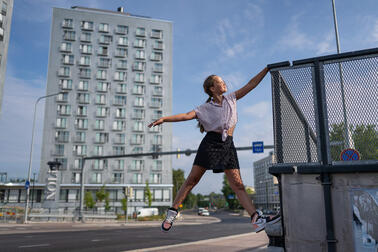
We need to do something. Head of General Upper Secondary Education Tarja Aro-Kuuskoski and Head of Student Welfare Services Riina Ståhlberg came to this realisation in early 2024. The annual Youth Barometer has shown signs of declining faith in the future among young people aged 15–29 for some time now. Challenges in learning, well-being, health, social skills and emotional skills have also been observed in secondary education institutions in Helsinki.
“We realised that we have to be able to address the root causes and support students before these issues reach a critical point,” says Tarja Aro-Kuuskoski.
Riina Ståhlberg and Tarja Aro-Kuuskoski took their insight and built the pedagogy of hope, which is based on operating models and approaches proven to work in general upper secondary schools and student welfare. It is focused on valuing people, seeing the good in people and highlighting strengths in daily life.
“The pedagogy of hope is built on observations made in positive psychology, resilience research and the SchoolWell research project. We want to strengthen well-being through focusing on the culture of achievement to benefit everyone,” says Aro-Kuuskoski.
Riina Ståhlberg stresses that the aim is not to deprive teachers of their pedagogical freedom:
“Rather, the idea is to offer more tools in everyday life so that we can strengthen learning and well-being at the same time.”
Human relationships play an important role in learning
This spring, the pedagogy of hope has been a common theme in the ‘Toivon johtamisen aamukahvit’ (morning coffee with the management of pedagogy of hope) webinar series. The events, facilitated by Leadership Trainer Elina Aaltolainen, discussed the principles of safe communities, the meaning of work, individual strengths, the acceptance of incompleteness and managing emotions.

“Principals and supervisors are the conductors of operating culture in educational institutions, which is why we wanted to discuss the management of hope together with them,” Riina Ståhlberg says.
Students were given the opportunity to make proposals to improve their ability to cope and learn through the Advisory Board forum.
“We must foster an operating culture where each individual from student to principal is valued and we are able to see the good in people. This will improve well-being throughout the community and have a positive impact on learning,” Ståhlberg says.
Improving interaction skills is an essential part of the pedagogy of hope.
“Studies have shown that relationships between students, for example, play an important role in learning. But we must also pay attention to the relations between teachers and students and between teachers. Everyone wants to be seen and heard.”
Tarja Aro-Kuuskoski hopes that more emphasis will be placed on interaction relationships and emotional skills already in teacher education.
“It is beneficial to consider whether we are paying too much attention to mistakes and weaknesses already at that stage instead of highlighting everyone's strengths.”
Pedagogy of hope in the daily lives of general upper secondary schools
Vuosaari Upper Secondary School Vice Principal Emma Pihkala believes that the pedagogy of hope is the exact direction that educational institutions now need. She could already see the need for change when she taught music and served as a special educational needs teacher, and the feeling has only grown stronger in her leadership role at Vuosaari Upper Secondary School.
“It is easy to blame young people for their poor learning skills or lack of persistence and blame their phones for all of this. When it has actually been us adults who have created the world as we know it.”
According to Pihkala, the management and teachers at educational institutions play an important role in the construction of a safe learning environment. She has observed many young people not daring to ask for help when they are struggling, even if help is available.
“We need to strengthen the culture of confidential discussion and get rid of the idea that everyone should manage alone. We could also word it better that we all feel insecure at times and that it is normal. Warm encounters and caring are of great significance,” Pihkala believes.
At Vuosaari Upper Secondary School, practical implementation of the pedagogy of hope is currently being discussed in subject groups and teams.
“Completing major structural changes like these is demanding on leadership, as well. People adopt things at different speeds and there may be resistance to change, but we can overcome these challenges.”
Helsinki participates in national Futures Work in Comprehensive Schools
The pedagogy of hope is also linked to the national changes in support for learning, which will enter into force on 1 August 2025 in general upper secondary education. Going forward, students have the opportunity to receive an administrative decision on the need for special needs education. Subject teachers play an important role in overcoming obstacles to learning.
Helsinki is building an operating culture where supporting learning is a natural part of the everyday activities of educational institutions.
“Different learning challenges are part of life and solutions are sought together with the student. This will enable students to complete their general upper secondary school studies despite their personal challenges. The starting point is to support, develop and utilise student strengths and to ease obstacles to learning,” Riina Ståhlberg clarifies.
Specialists from the City of Helsinki have also been consulted on the national Futures Work in Comprehensive Schools, which is currently being compiled at the Ministry of Education and Culture. Senior Specialist Venla Bernelius from the Ministry of Education and Culture considers the pedagogy of hope an important building block of the school of the future.
“Meaning and hope are truly important themes globally. We cannot simply wait for something good to happen. Visions and objectives must also be put into practice,” Bernelius says.


